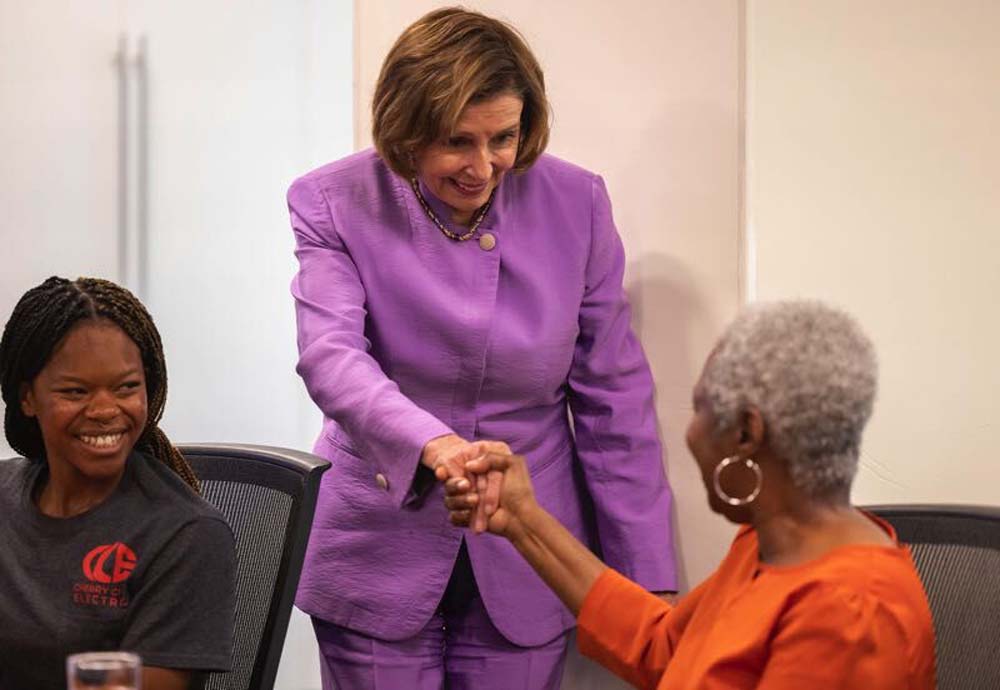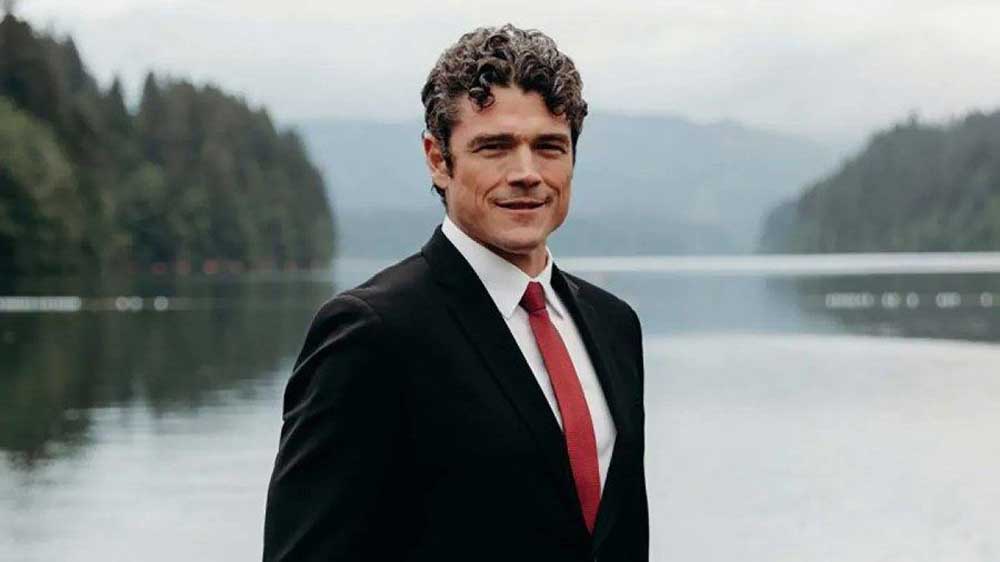Pelosi hears about energy and climate change legislation
Published 12:00 am Tuesday, September 6, 2022

- House Speaker Nancy Pelosi greets Sammie Lewis, a North Portland homeowner who has benefited from new solar panels, a heat pump and insulation, at a panel discussion Tuesday, Sept. 6, at the Energy Trust of Oregon offices in Portland. Next to Pelosi is Alana Graves, an apprentice with the National Electrical Contractors Association/International Brotherhood of Electrical Workers.
House Speaker Nancy Pelosi heard Oregon panelists discuss how recent federal legislation will promote carbon-free energy, create thousands of skilled jobs and help communities cope with the onset of climate change.
Trending
Pelosi was flanked by two Oregon Democrats who made major contributions to that and other recent legislation during the discussion Tuesday, Sept. 6, at the Energy Trust of Oregon offices in Portland. They are Rep. Earl Blumenauer of Portland, a senior member of the tax-writing committee, and Rep. Suzanne Bonamici of Beaverton, who sits on the science committee.
Both also have been involved with the House select committee on climate change — Blumenauer the first time Pelosi led the House (2007-11) and Bonamici the second time (since 2019). The committee cannot originate legislation, but Pelosi said much of its work ended up in the legislation known as the Inflation Reduction Act. More than half of its $700 billion goes to grants and other incentives for carbon-free energy and climate-change measures over 10 years.
“We jumped for joy when this bill was passed, because we’ve been at it for a long time,” Pelosi said. “No one has ever seen anything (for climate change) of that size.”
Trending
The Democratic majority in the House passed a broader version last year — only one Democrat voted no, along with all Republicans — but it almost died twice in the evenly divided Senate, which finally approved a stripped-down bill Aug. 7. The House repassed it Aug. 13.
“It came together in this legislation in a way that was marvelous,” said Blumenauer, who shaped many of its tax provisions as a member of the Ways and Means Committee.
The House passed cap-and-trade legislation in 2009, when Pelosi was speaker the first time. But the Senate let it die in 2010, and no national legislation passed to cap greenhouse gas emissions or allow trading by affected industries, unlike what happened in Europe. The new federal law relies largely on incentives, though it requires monitoring of methane, a more potent greenhouse gas than carbon dioxide.
“The Inflation Reduction Act is about more than the climate, though that is a lot,” Pelosi said. “We view saving the planet as a health issue.”
Much of the rest of the law is for extended subsidies (through 2025) for individual health insurance premiums under the Affordable Care Act. The law, which President Joe Biden signed Aug. 16, also empowers the federal government to negotiate some prescription drug prices under Medicare, caps out-of-pocket costs for drugs at $2,000 annually per Medicare recipient — and for insulin, $35 monthly per recipient — and requires rebates by drug companies if prices rise beyond inflation.
More work ahead
Pelosi and the others say there is more work to be done on climate change and other issues.
“I see this as breaking a logjam,” Blumenauer said. “I think there is going to be more incentive for people to go along with the things we are talking about, and it will be easier. In the meantime, there is more than enough to keep everybody busy in the next two or three years to build on what we’ve got.”
Bonamici has said that thousands of new jobs will result not only from this law, but the $1 trillion in infrastructure spending that Biden signed last year, plus the $52 billion in federal aid for semiconductor manufacturing (and $200 billion for scientific research) that Biden signed Aug. 9.
“We need more workforce programs for people to do those jobs,” said Bonamici, who also sits on the Education and Labor Committee, and the Science, Space and Technology Committee.
The new law also is estimated to result in 40% less in greenhouse gas emissions by 2030, based on 2005 figures. Biden has set a target of 50% on the way to a net-zero goal by 2050.
“We know we need to do more in terms of reducing carbon emissions,” she said.
Bonamici also has been an advocate of doing more to improve the oceans, which cover 70% of the planet, and reduce the acidification that threatens marine life. “If the ocean is not healthy, the planet is not healthy,” she said.
Pelosi spoke in broader terms, assuming Democrats can hang onto their tenuous majority.
“We fully intend to win. When we do, the other piece of our Build Back Better legislation is essential. It’s the family piece,” some of which the House included in its budget reconciliation last year, but the Senate scrapped.
Among those proposals: An expanded child tax credit, which was in place during 2021 but only for one year; federal aid for child care; a universal pre-kindergarten program; a federal program of paid family medical leave (Oregon plans to start state benefits in September 2023), and expanded home health care.
“We think there have to be more women in the workplace to do all of these things,” Pelosi said. “We believe that when women succeed, America succeeds.”
Stories matter
Pelosi, Blumenauer and Bonamici heard from five people who discussed how the new energy and climate-change provisions will affect them.
“Your telling your stories really does put this in perspective for us. When we talk about policy in the abstract, it’s not the same as telling how a policy affects real people,” Bonamici said.
“It’s clear … that it’s going to make a difference in addressing climate change while also creating lots of good jobs. All of us will be working in Congress to continue the work we’ve done to make a better future for Oregonians and America.”
The panelists:
• Alana Graves, an apprentice for the National Electrical Contractors Association/International Brotherhood of Electrical Workers. She applied for the program and was accepted after she graduated from high school and attended a summer camp sponsored by Oregon Tradeswomen, a nonprofit that promotes careers.
“From there, it’s just been about the work, how much work is available, and the amount of minorities — people of color — we need on our jobs. When it comes to providing the work, our outreach has to continue.”
• Sammie Lewis, a North Portland homeowner who has been a client of Community Energy Project and has benefited from new insulation and the installation of a heat pump and rooftop solar panels. “They have helped me get my home outfitted with a lot of services that have reduced my energy bills,” to the point of amassing credits. “By choosing renewable energy, I took the first steps toward controlling my own home energy use.”
• Charity Fain, executive director of the Community Energy Project, which supports energy efficiency for low-income households: “We really feel strongly that all homes should be electrified as fast as possible… We want to make sure that any traditional barriers that might have been in past programs have been eliminated.”
• Ernesto Fonseca, chief executive of Hacienda Community Development Corp., based in Portland to support housing, homeownership and economic opportunities: “We haven’t seen anything of this magnitude, ever,” and that new federal money could help his organization aid up to 2,000 households.
• Tracy Scott, director of energy programs for the Energy Trust of Oregon: “Everything we do (in energy) just got cheaper and faster,” and not just in making homes and other buildings more energy-efficient, the nonprofit’s main goal since it began 20 years ago.
pwong@pamplinmedia.com
twitter.com/capitolwong
NOTE: Comments from panelists have been added.







